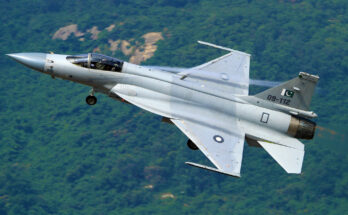The tri-national Future Combat Air System (FCAS; or Système Combat Aérien Futur, or SCAF, in French) has now officially launched as the governments of France and Germany together awarded the initial framework (Phase 1A) contract on February 12.
The lag between the unveiling of a mock full-scale model at the Paris Air Show in June 2019 and the inking of the Phase 1A demonstrator contracts stemmed from German requirements that any defense-related project costing at least EUR25 million or more is subject to a separate approval by the Budget Committee of the Bundestag (federal parliament). Despite pressure applied by French Armed Forces Minister Florence Parly and industry officials, German parliament did not approve Berlin’s EUR77.5 million share of the EUR155 million budget agreed to jointly with France until February 12, thereby clearing the way for official launch of the demonstrator phase contracts.
Le parlement allemand vient de valider une étape cruciale pour le système de combat aérien du futur qui équipera les armées espagnole, allemande et française. Les voyants sont au vert pour développer un prototype d'avion de combat, qui volera en 2026. 🇫🇷🇩🇪🇪🇸
— Florence Parly (@florence_parly) February 12, 2020
The third partner in the FCAS, Spain, is currently negotiating with France and Germany for its contributory share and is expected to join up later in the year. Spain’s industrial effort in the project is overseen by Indra.
Germany and France launch #FCAS/#SCAF demonstrator phase, Spain to follow shortly. Phase 1A pertains to New Generation Fighter (#NGF), Remote Carrier loyal-wingman, and Air Combat Cloud. https://t.co/prPDx41ECA pic.twitter.com/tBFzhwD8wd
— Gareth Jennings (@GarethJennings3) February 13, 2020
The contracts awarded by France and Germany were extended to Dassault Aviation, Airbus, MTU Aero Engines, Safran, MBDA, and Thales.
At the center of the FCAS is the sixth-generation New Generation Fighter (NGF), the element France is taking the lead in developing.
The NGF is to operate in conjunction with a swarm of drones – unmanned combat aerial vehicles (UCAVs) referred to as “remote carriers” (RCs) – that will serve as weapons platforms and as advanced sensors. These two systems, which are to function together, are collectively referred to as the Next-Generation Weapon System (NGWS).
The NGWS will fit into the large, networked range of systems, the aforementioned FCAS. The FCAS will include the European Medium-Altitude Long-Endurance (MALE) Remotely Piloted Aircraft System (RPAS), an ultra-low-observable UCAV, future cruise missiles, and other airborne platforms operating together in future operations scenarios through a common software architecture and broad network termed the Air Combat Cloud (ACC).
The Phase 1A contract awarded jointly by France and Germany covers an 18-month period involving initial developmental work on the demonstrators and maturing their innovative technologies.
The technological demonstrator concepts being focused upon concern multiple elements. These include the NGF (under which Dassault serves as prime contractor with Airbus as main partner), the unmanned systems Remote Carrier (Airbus serves as prime contractor with MBDA as main partner), the Air Combat Cloud (Airbus as principal contractor with Thales as main partner), and the engine (a partnership between Safran and MTU). Design of the airframes for the NGF and Remote Carrier, their systems, a simulation environment, integration and test strategies, and the initial production strategy all form part of the Phase 1A study.
The goal remains to undertake flight tests on the fighter technology demonstrator by 2026.

Dan Darling is Forecast International’s director of military and defense markets. In this role, Dan oversees a team of analysts tasked with covering everything from budgeting to weapons systems to defense electronics and military aerospace. Additionally, for over 17 years Dan has, at various times, authored the International Military Markets reports for Europe, Eurasia, the Middle East and the Asia-Pacific region.
Dan's work has been cited in Defense News, Real Clear Defense, Asian Military Review, Al Jazeera, and Financial Express, among others, and he has also contributed commentary to The Diplomat, The National Interest and World Politics Review. He has been quoted in Arabian Business, the Financial Times, Flight International, The New York Times, Bloomberg and National Defense Magazine.
In addition, Dan has made guest appearances on the online radio show Midrats and on The Media Line, as well as The Red Line Podcast, plus media appearances on France 24 and World Is One News (WION).




